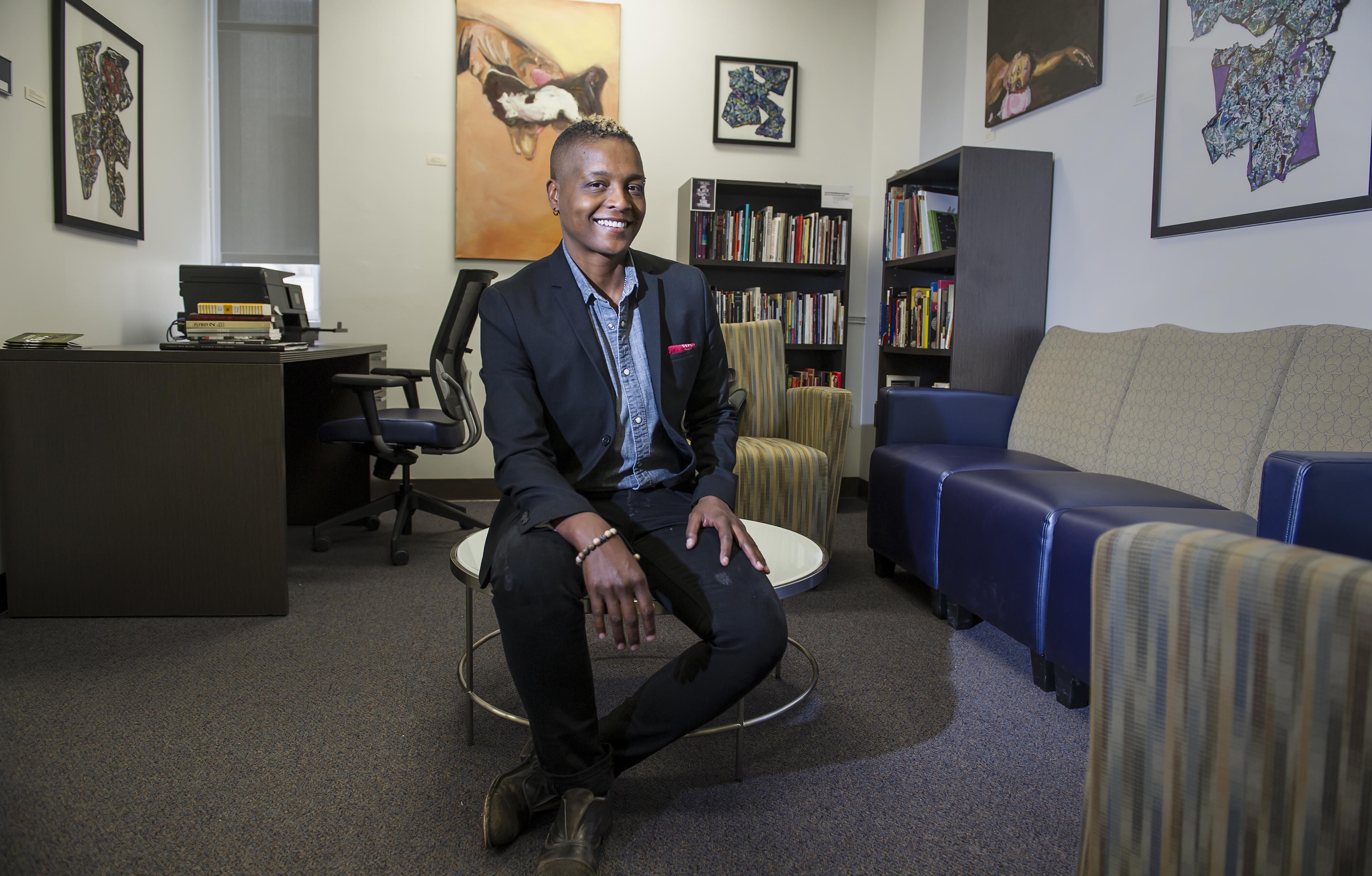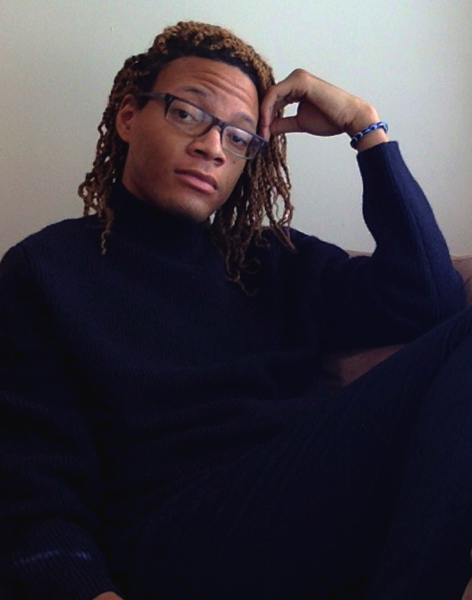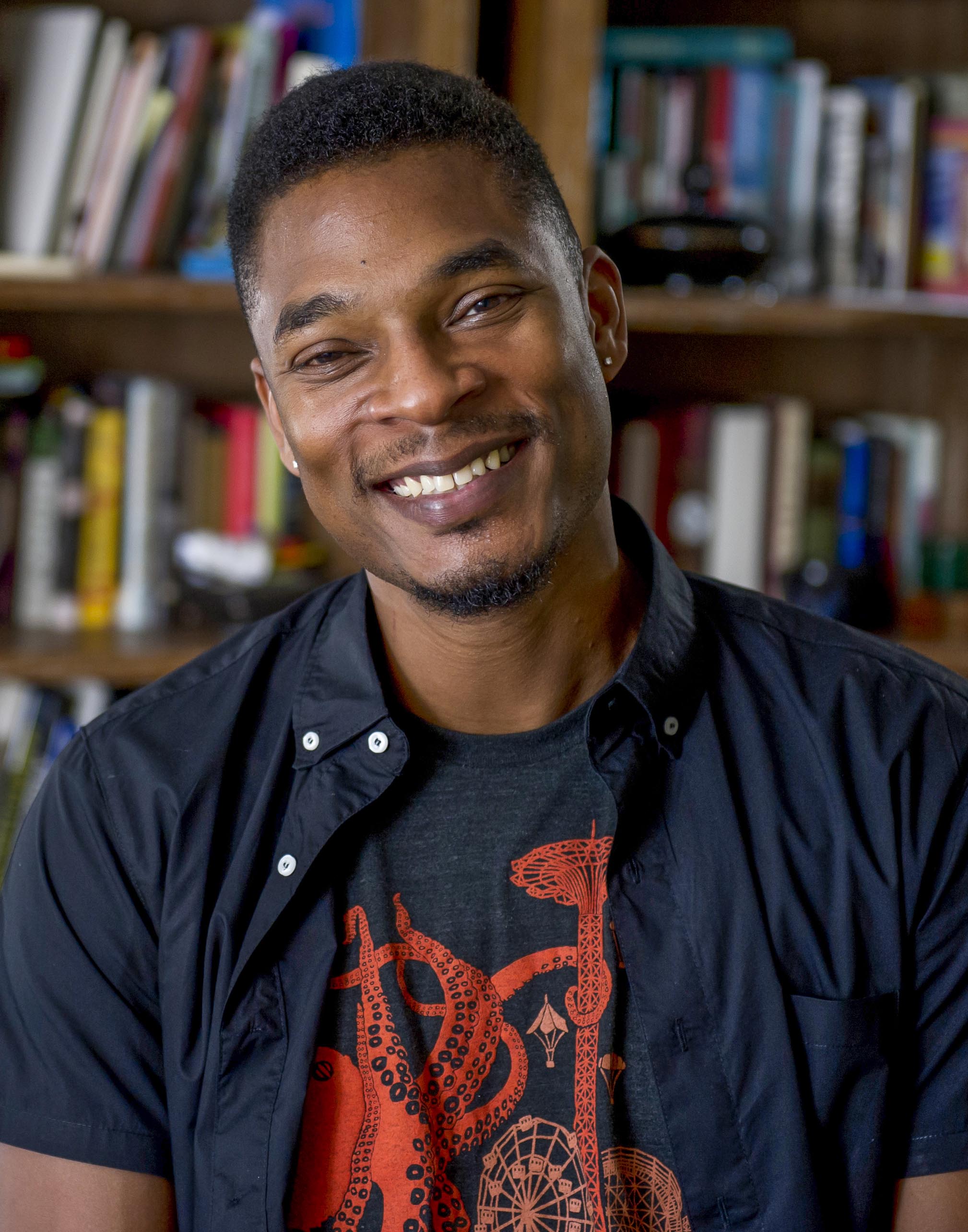
By DONOVAN HARRELL
When the Center for African American Poetry and Poetics, or CAAPP, was founded two years ago, its mission was to design a space for black creatives to produce and present their work and archive black poetry.
Co-founder and CAAPP Director Dawn Lundy-Martin said the center has made significant progress with this mission. Martin wants to keep the momentum going, she said, making sure CAAPP doesn’t become stagnant as she sets her sights on improving the center’s reach to Pitt’s surrounding communities.
Things have changed a lot since the center was founded, Lundy-Martin said. The inaugural fellowship, given to Rickey Laurentiis, is coming to an end. Terrance Hayes, a co-founder of CAAPP and MacArthur Fellow, has moved on to a position at New York University.
The University Times caught up with Lundy-Martin, who explained her goals for CAAPP and talked about some of the center’s upcoming events. The conversation has been edited for conciseness and clarity.
How have things progressed since CAAPP was founded? How are things going?
Really great! It’s kind of surprising to know that we’ve only been around for a little over two years because it seems like so much has happened. We’re currently still in the process of actualizing some of the ideas that we initially put forth in our original mission and vision for this center. So, our mission is really three-pronged: first, it’s to provide a space for black poets and other artists to come together to create new work; second, we want to give these poets and artists the opportunity to present new work in unconventional ways.
The third part of our mission is to archive this moment in African-American poetry and poetics. What we see is a kind of new renaissance of African-American poetry in this country, and we want to make sure that there is a really in-depth record of the significance of this particular moment. So, we’re still trying to flesh out all of those three areas, making a place for people to come together and make work in interesting ways, a place where people can come to present their work and also this archival aspect of the work that we do.
Do you have a timeline for when you expect to roll out the archives?
We are extremely diligent and making sure that we document in whatever ways are at our disposal, whether it be video or photographs, or keeping the posters that advertise our events in some organized way. Anybody who comes through the center to do anything, we make sure that we archive that experience for future generations. So, you can find a really good online archive of work that folks are presenting both on campus and in the community at large. That’s one thing that’s actually happening. The part that we’re super excited about, … but will be launched fully this summer, is the Cave Canem Oral History Project.
We want to make sure that we maintain our connections to Cave Canem, the Cave Canem Foundation and the Cave Canem retreat for African-American poets. Because this particular moment that I’m talking about — the new African-American and African diasporic renaissance of poetry — is in part, a significant part, I would say, brought into being by all of the work that Cave Canem has done. …
Yona Harvey, a professor at Pitt and also a CAAPP faculty affiliate, will be in charge of launching that project at the Cave Canem retreat this summer. (It) is an attempt to get oral histories from every single living person who has been affiliated with Cave Canem. All of the fellows, all of the faculty, all of the staff, all of the book prize winners in order to have a really ongoing, living, breathing document and testimony to Cave Canem and the broad experiences that it’s enabled for hundreds and hundreds of poets. So that’s our big archival project that we’re launching this summer.
 You’ve been advertising for an opening in the fellowship position. Can tell me a bit about the current fellow?
You’ve been advertising for an opening in the fellowship position. Can tell me a bit about the current fellow?
Rickey Laurentiis (has) been the CAAPP fellow for a year and a half, but his term is finishing. He was the inaugural fellow. He’s done a brilliant job in his capacity as a CAAPP fellow. He sets the bar really high for the person to come next. We’re just opening up the application once again.
I see that Terrance Hayes has moved onto a position with NYU. How will he still be involved with the center?
I think we have him listed as the co-founder of the center, because it is he and I who were the original co-directors. And since he’s moved on, I’m the sole director of the center. But Terrance will continue to serve in an official advisory capacity. He will be on the advisory council as his official role and he’ll come back to the center periodically to work with students, and to present new work himself. And we’ll give him a space if he needs it to work on new projects. He’ll continue to have an active role as an advisor.
And Rickey and Terrance will be collaborating for an event on Jan. 24?
As a part of Rickey’s fellowship, at the last term, he’s required to show us what he’s been up to. Which means that he’s going to present new work that he’s written over the past two years, and Terrance will read with him. Terrance is the person who picked Rickey’s book for his first-book prize. It’s a really nice coming together of mentor and mentee generations of black poetry. And it’ll give us an opportunity to also see what Terrance has been up to in his work. We’re excited about that. Terrance is going to do a three-day master class with 10 graduate students and/or advanced undergraduates — whoever signs up first. And that’ll have a community aspect. So, this will be a nice chance for students to be able to spend some time inside Terrance’s creative mind.
U.S. Poet Laureate Tracy K. Smith was here on Nov. 14 and 15. How did that event come together?
She’s an old friend and this was our first opportunity to collaborate with Pittsburgh Arts & Lectures. So, I think it gives the event a kind of nice positioning at the intersection of community off campus and community on campus. Tracy also has a connection to Pittsburgh and she was super excited to come back in her new role as poet laureate.
Switching gears a bit, do you have a physical space for CAAPP now? Do you have plans for one in the future?
We have our CAAPP offices and art exhibition space on the fourth floor (of the Cathedral of Learning). It serves as both our office space and a small gallery space. And we are in conversation with the folks in charge of the Community Engagement Centers. We’ve been talking to the community engagement folks about having a part of that space in the Hill District so that we have a real presence in the community and can work directly with artists who live in Pittsburgh but might not be associated with the University yet. …
I’m really interested in these spaces where off-campus community and on-campus community can conveniently come together. That’s an exciting interchange for me.
What are some of the challenges you face, and do the racial demographics of Pitt and Pittsburgh make recruiting for the center difficult?
I think one of the big challenges is that we’re a center that’s inside of the English Department and associated with the master’s program and creative writing, the MFA program and the writing program. And we are also funded by the dean’s office to large degree, generously, but we’re also kind of a link to all of those entities. So, the MFA programs have to thrive in order for us to thrive.
The opportunity, though, is that even though there are some challenges when it comes to racial diversity on campus, especially when you look at the percentage of African-American students at the undergraduate level, I think that CAAPP can be a really big attraction. So if our profile is raised and recognized, folks know that we exist, and that the University is really committed to not just diversity, but to celebrating the work — the creative work and scholarship of folks who really represent what this country looks like — I think that’ll be a draw for talented students of all races to come to at the undergraduate and graduate level. …
I feel like there has been investment in the MFA program but I’m not sure if that investment is going to deepen. I would like to see it deepen over time, and there be a really full commitment from the University to elevating this entity alongside the amazing support that they’re giving us, because we can’t exist and thrive in a bubble.
What are your hopes for CAAPP in the future?
One of the new projects that we’re developing and conceptualizing and launching is how we have all these community partners in Pittsburgh and we work with them in various ways. Anytime anyone comes through the center to do any work, we make sure that there’s a community aspect to that work. That’s why Tracy K. Smith will be doing a talk at the Hill District, Carnegie Library. We want to make sure that happens.
But we want to do more than that now. At this intersection of on-campus and off-campus community, we’re developing a set of projects that give folks, more people from Pittsburgh, an opportunity to develop their work with professional artists, both from Pittsburgh and from outside of Pittsburgh. …
We’re also developing the artistic skills of people right here in Pittsburgh and connecting them to the University in ways that they may not have done before.
Is there anything else you want to add?
It says on our website that we think of ourselves as a creative think tank. We never, I never want CAAPP to be a static entity that merely … brings people to town (for a reading or talk). I want us to continue to be a dynamic, innovative institution situated at the intersection of communities, on campus and off campus, that’s continually thinking about the work, revising itself, looking inward to say, ‘OK, what else can we do that’s interesting and exciting so that we’re kind of a startup but we’re also a creative think tank.’ I never want us to be static in the way that we think about the work that we’re doing, so we’re constantly revising it and rethinking it.
Donovan Harrell is a writer for the University Times. Reach him at dharrell@pitt.edu or 412-383-9905.
